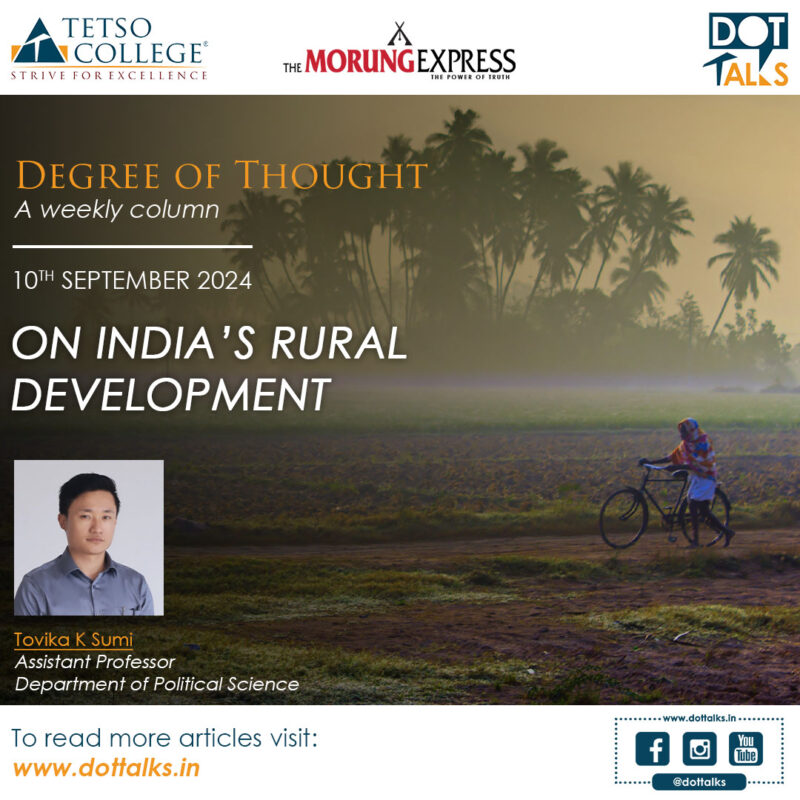On India’s Rural Development
The term development is directly related to the economic capacity of the state but one should also mention the ongoing theoretical debate involved which consists of various social concerns like poverty, unemployment, health etc. The meaning of development is complex and engages the intellectual community in issues of justice and equality. The term has been seen as an important component of growth in the economic paradigm and when placed within the social, it is seen as possessing free and equal societal relationship in terms of accessibility of resources and best utilization of the same.
Finance minister Nirmala Sitharaman tabled the Economic Survey on July 22 showing optimistic view on India’s development; India has retained its tag as the fastest growing economy with IMF and Asian Development Bank forecasting India to reach 7 percent growth this year. However, this is a narrow understanding of development when one sees it only in terms of statistical growth of GDP, booming stock market, rising foreign reserves, increased FDI, fast food, fast cars, or the mall culture.
India has a significant disparity between urban and rural areas in terms of infrastructure, education, healthcare, and employment opportunities. Many regions, especially in rural areas still suffer from inadequate infrastructure; including poor road connectivity, insufficient power supply, and lack of basic amenities. Furthermore, lack of basic food & widespread unemployment is still a great concern in many of the rural areas such as the North East region of India. It has become a regular occurrence to witness unfortunate news in pertinence to the matter at hand, such as the recent distressful news where a 37-year-old tribal woman from Tripura’s Dhalai district, who was grappling with abject poverty following her husband’s death five months ago, was found to have sold her newborn for Rs 5,000 to merely survive for the month. The recently declared NITI Aayog SDG index disclosed Nagaland as one among the worst performing states alongside Bihar, and Jharkhand. The effects of underdevelopment in Nagaland can be seen more explicitly in its Eastern region to the extent of having little to no proper basic infrastructure such as health and education with the road connectivity being at its most dismal condition.
There is a strong requirement for investment in the rural areas not just for facilitating the traditional economic activities such as handicrafts and agricultural practices, but also to bring out innovative and new economic activities as improving the socio-economic status in rural districts is relevant in creating inclusive and sustainable growth. Therefore, initiatives like investment in rural infrastructure, rural digitisation are imperative for the development of the rural economy.
Women entrepreneurs also play an important role in the overall growth of our country especially in rural areas. Women owned Micro, Small, and Medium Enterprises (MSME’s) in India have demonstrated an impressive result, employing 11% more women employees in comparison to the male owned MSME’s, thereby creating nearly 33% of all new jobs. Implementing a robust ecosystem that provides access to crucial business services such as finance, markets, skills, networks and even mentoring would greatly accelerate women’s entrepreneurship.
We must also realise that merely putting pressure on the government with facts and figures seen on the news does not entirely get the job done. In fact, each of us are stakeholders in this journey towards development, individually contributing largely to the growth of our country by performing our duties with justice daily. If an Administrator of a particular District is doing a commendable job in executing policies fairly, he is contributing to the growth of this country; if a teacher consistently strives to educate their students holistically nurturing an all-round development of knowledge not only literal but applicable as well he/she is contributing towards the development of India and if a student thus dedicates their capabilities and aptitude towards attaining knowledge and skills with a purpose, he/she is directly contributing to the trajectory of India’s growth.
Therefore, the concept of development is multifaceted, encompassing both economic growth and social well-being. While India has made significant strides in its economic trajectory, addressing the persistent disparities and challenges in rural areas remains crucial for inclusive and sustainable development. By investing in rural infrastructure, promoting women’s entrepreneurship, and fostering a sense of collective responsibility, we can create a more equitable and prosperous nation for all. It is imperative that we move beyond a narrow focus on GDP growth and prioritize the development of all citizens, ensuring that the benefits of progress reach those who have been historically marginalized.
Degree of Thought is a weekly community column initiated by Tetso College in partnership with The Morung Express. Degree of Thought will delve into the social, cultural, political and educational issues around us. The views expressed here do not reflect the opinion of the institution. Tetso College is a NAAC Accredited UGC recognised Commerce and Arts College. The editorial team includes Chubamenla, Asst. Professor, Dept. of English and Rinsit Sareo, Asst. Manager, IT, Media & Communications.
For feedback or comments please email: dot@tetsocollege.org


